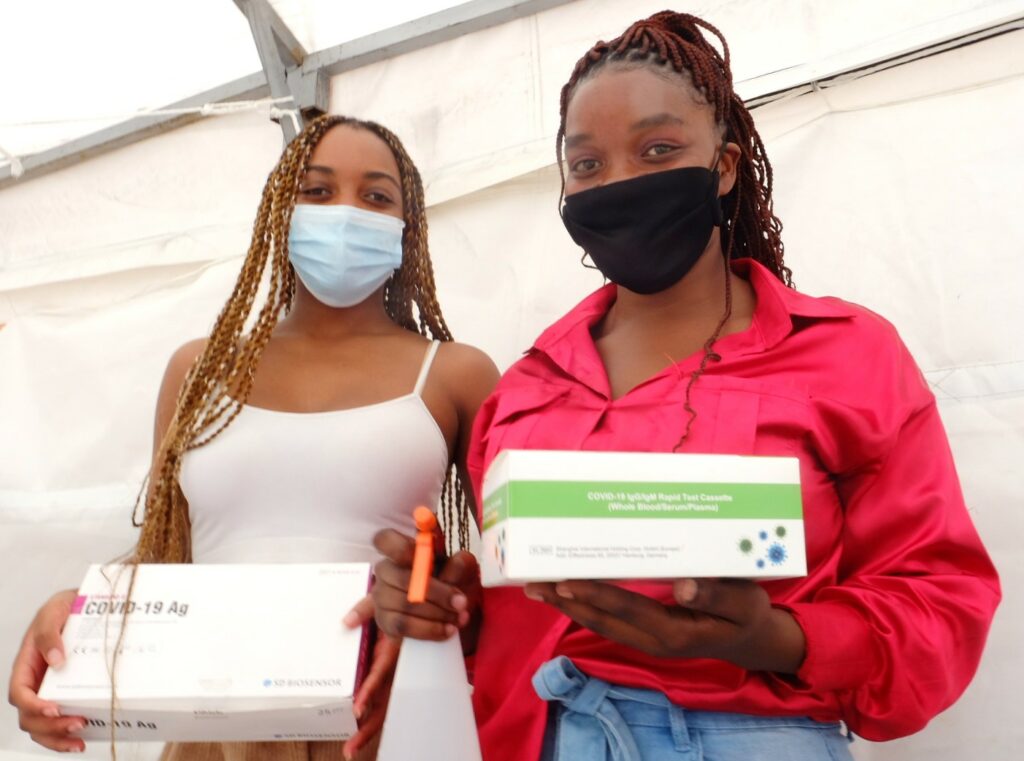By STAFF REPORTER
Low-cost, SAHPRA-approved COVID-19 rapid antigen tests are now available next to Spar in African Street and at the Bantu Stephen Biko Building on the Rhodes University campus.
The community testing station
Any member of the public can get test results in 15 minutes in a tent behind the Spar in African Street. The tests will be conducted by a nurse or trained healthcare professional.
Antigen tests are R350, and antibody tests are R199. The site is open from 7 am-5 pm, seven days a week.

The Rhodes testing station
The Rhodes testing site will support the return to work and study of all Rhodes University staff and students. All staff, students and their immediate families are welcome to use the facility to get tested. The R200 test is conducted in the Reading Room of the Bantu Stephen Biko Building, adjacent to Oppidan Dining Hall. Cash and card services are available. Lower rates are available for block bookings of 10 or more.

The site will be open for advance block bookings from Monday to Friday from 8 am to 5 pm. Weekend bookings are also possible by prior arrangements. You may come directly to the facility during its operating hours or make a booking. Bookings can be made by emailing L.Madikiza@ru.ac.za or phoning 063 259 2768.
The subsidised tests have been made available through a public-private partnership. For more information, please contact: Lwazikazi Madikiza on cell: 063 259 2768
What is the difference between an antibody test and an antigen test?
According to the Mayo Clinic, antibody testing determines whether you had COVID-19 in the past and now have antibodies against the virus.
A test to diagnose COVID-19 determines if you currently have the disease. Here’s what you need to know about testing.
When is antibody testing done, and why is it important?
Antibody testing, also known as serology testing, is usually done after full recovery from COVID-19. A health care professional takes a blood sample, usually by a finger prick or by drawing blood from a vein in the arm. Then the sample is tested to determine whether you’ve developed antibodies against the virus. The immune system produces these antibodies — critical proteins for fighting and clearing out the virus.
If test results show that you have antibodies, it indicates that you were likely infected with COVID-19 at some time in the past. It may also mean that you have some immunity. But there’s a lack of evidence on whether having antibodies means you’re protected against reinfection with COVID-19. The level of immunity and how long immunity lasts are not yet known.
The timing and type of antibody test affect accuracy. If you have tested too early in the course of infection, when the immune response is still building up in your body, the test may not detect antibodies. So antibody testing is not recommended until at least 14 days after the onset of symptoms.
What tests are used to diagnose COVID-19?
PCR test. Also called a molecular test, this COVID-19 test detects the virus’s genetic material using a lab technique called polymerase chain reaction (PCR). PCR tests are very accurate when properly performed by a health care professional, but the rapid test can miss some cases.
Antigen test. This COVID-19 test detects specific proteins in the virus. A positive antigen test result is considered accurate when instructions are carefully followed, but there’s an increased chance of false-negative results — meaning it’s possible to be infected with the virus but have a negative result.
How can diagnostic and antibody testing help reduce the spread of COVID-19?
With COVID-19 diagnostic testing, people who test positive and have symptoms can get care earlier. Contacts can be traced, and self-isolation or quarantine started sooner to help stop the spread of the virus.
But no COVID-19 test is 100% accurate. It’s possible to test negative yet be infected (false-negative result) or to test positive and not be infected (false-positive result). So it’s vital to continue to practice social distancing and wear a mask appropriate.
Source: www.mayoclinic.org




